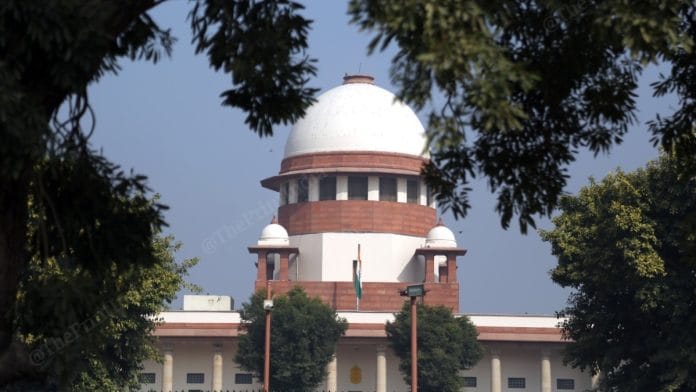New Delhi: A Constitution bench of the Supreme Court, led by Chief Justice of India B.R.Gavai, Tuesday sought a response from the Centre and all state governments, while acting on a presidential reference on the President and Governors’ powers of assent to bills.
“We have requested the Attorney General of India to issue notice to the Union of India as well as all other state governments,” the five-judge bench comprising Justices Vikram Nath, Surya Kant, P.S. Narasimha and A.S. Chandurkar also ruled, listing the matter for further hearing on 28 July.
In doing so, the top court essentially agreed to examine whether courts can set a deadline for the President or the Governors to act on state bills, under Articles 200 and 201 of the Constitution.
Article 200 deals with assent to bills passed by state legislatures, and entails the Governor’s powers regarding these bills, including whether to grant or withhold assent, or to reserve a bill for the President’s consideration.
On the other hand, Article 201 says that when a bill is reserved for the President’s consideration, he/she may assent to or withhold assent from the Bill. Additionally, the President can also, under this provision, direct the Governor to return the Bill to the House, so that it can be reconsidered.
The case that led to the reference
The President’s questions refer to the SC’s landmark ruling from 8 April in the plea against Governor R.N. Ravi by the Tamil Nadu government for withholding assent to 10 bills passed by the assembly.
A two-judge bench had ruled that Governors cannot sit over bills passed by the state legislature, while imposing a timeline of three months to give assent. In the same order, it set a three-month timeframe for the President to act on bills sent by a Governor in case the latter finds a state legislation to be inconsistent with a central law.
The division bench of Justices J.B. Pardiwala and R. Mahadevan had ruled that Governor Ravi’s action of withholding or sitting over ten bills was not only “erroneous”, but also “illegal”.
“There is no expressly specified time limit for the discharge of the functions by the Governor under Article 200 of the Constitution. Despite there being no prescribed time limit, Article 200 cannot be read in a manner which allows the Governor to not take action upon bills which are presented to him for assent and thereby delay, and essentially roadblock law-making machinery in the state,” it had ruled.
The queries
On 13 May, President Droupadi Murmu had sought the Supreme Court’s opinion on whether fixed timelines could be imposed by the judiciary on the President and the Governors for granting assent or approval to Bills without any constitutional provision to that effect.
Carving out 14 questions in this case, the President had by way of this reference, sought the court’s advice on these key issues. One of the questions that President Murmu has asked is: “In the absence of a constitutionally prescribed time limit, and the manner of exercise of powers by the Governor, can timelines be imposed and the manner of exercise be prescribed through judicial orders for the exercise of all powers under Article 200 of the Constitution of India by the Governor?”
A similar question has been raised linked to the timeframe set for the President with reference to Article 201. While Article 200 deals with the Governor’s powers to give assent to a state bill, Article 201 relates to similar powers that the President can exercise.
Broadly, Article 143 relates to the President’s power to consult the Supreme Court. According to Article 143(1), when questions of law or fact arise, and the President considers them to be of public importance, it is “expedient” or suitable to obtain an opinion of the apex court. This can be done by referring such questions of fact or law to the court for consideration, following which the court will report its opinion to the President.
The Supreme Court, however, has the discretion to decide whether to respond to the reference or decline to send a report to the President.
In the 1993 Ayodhya ruling, the top court refrained from giving its opinion upon the President’s Reference. The next year, it declined to answer “whether a Hindu temple or any Hindu religious structure existed prior to the construction of the Ram Janmabhoomi-Babri Masjid” in the area on which the structure stood.
(Edited by Tony Rai)
Also Read: Bathroom, beer & court proceedings. Virtual hearings now face more questions than answers






